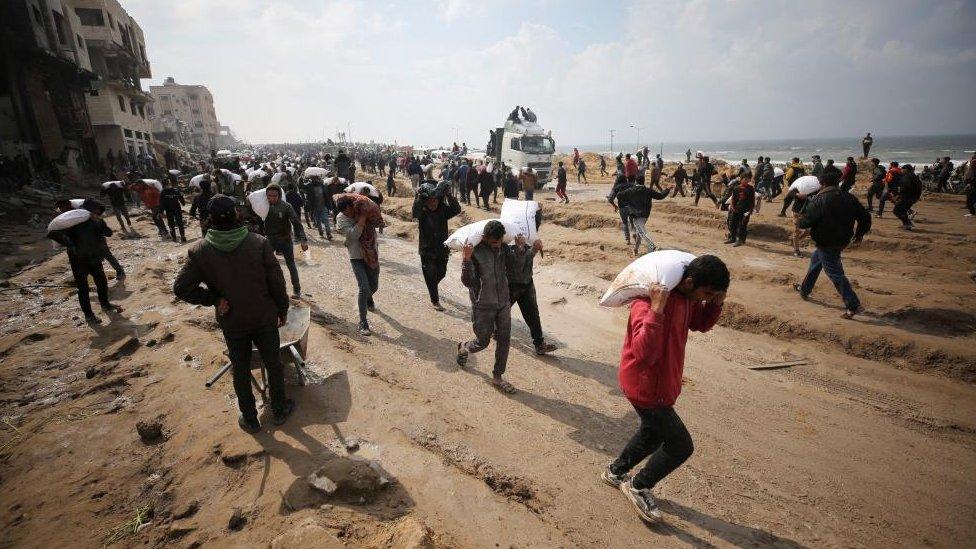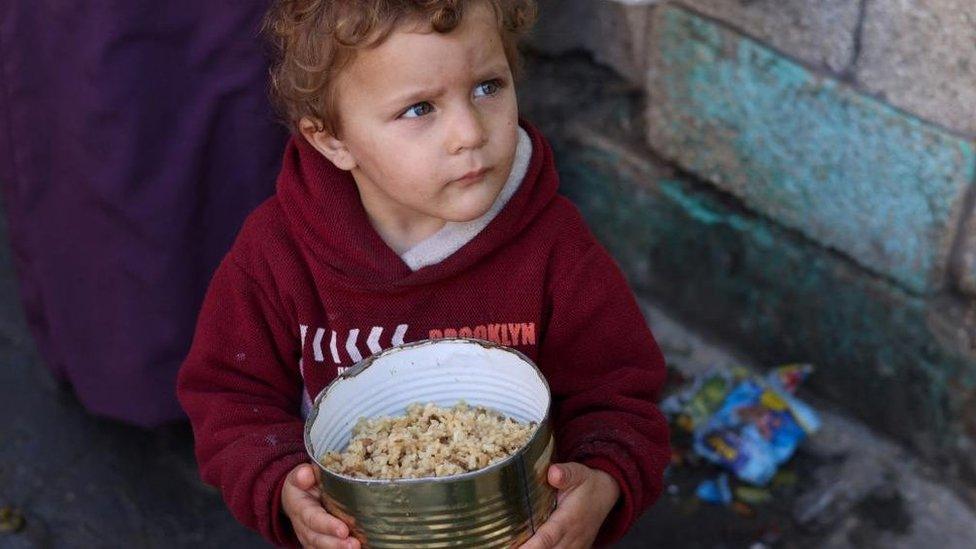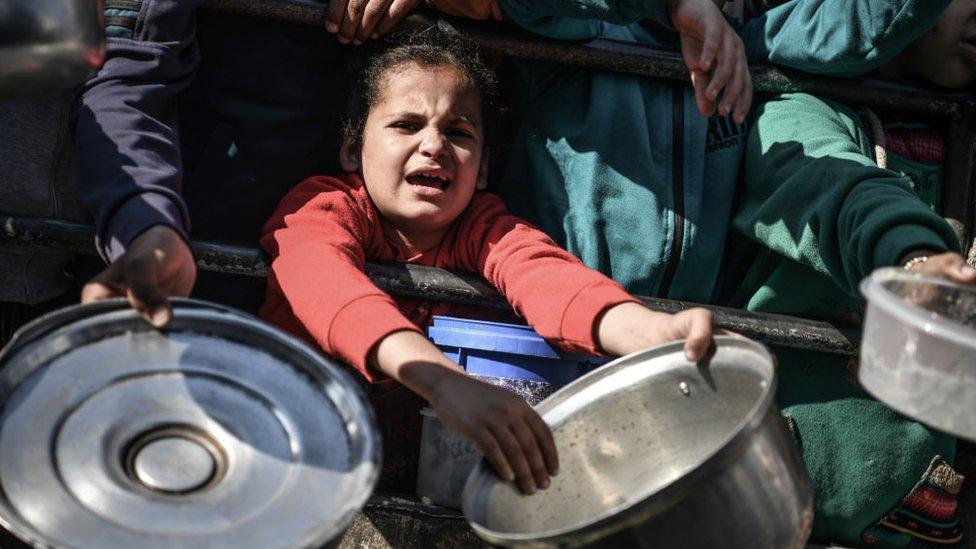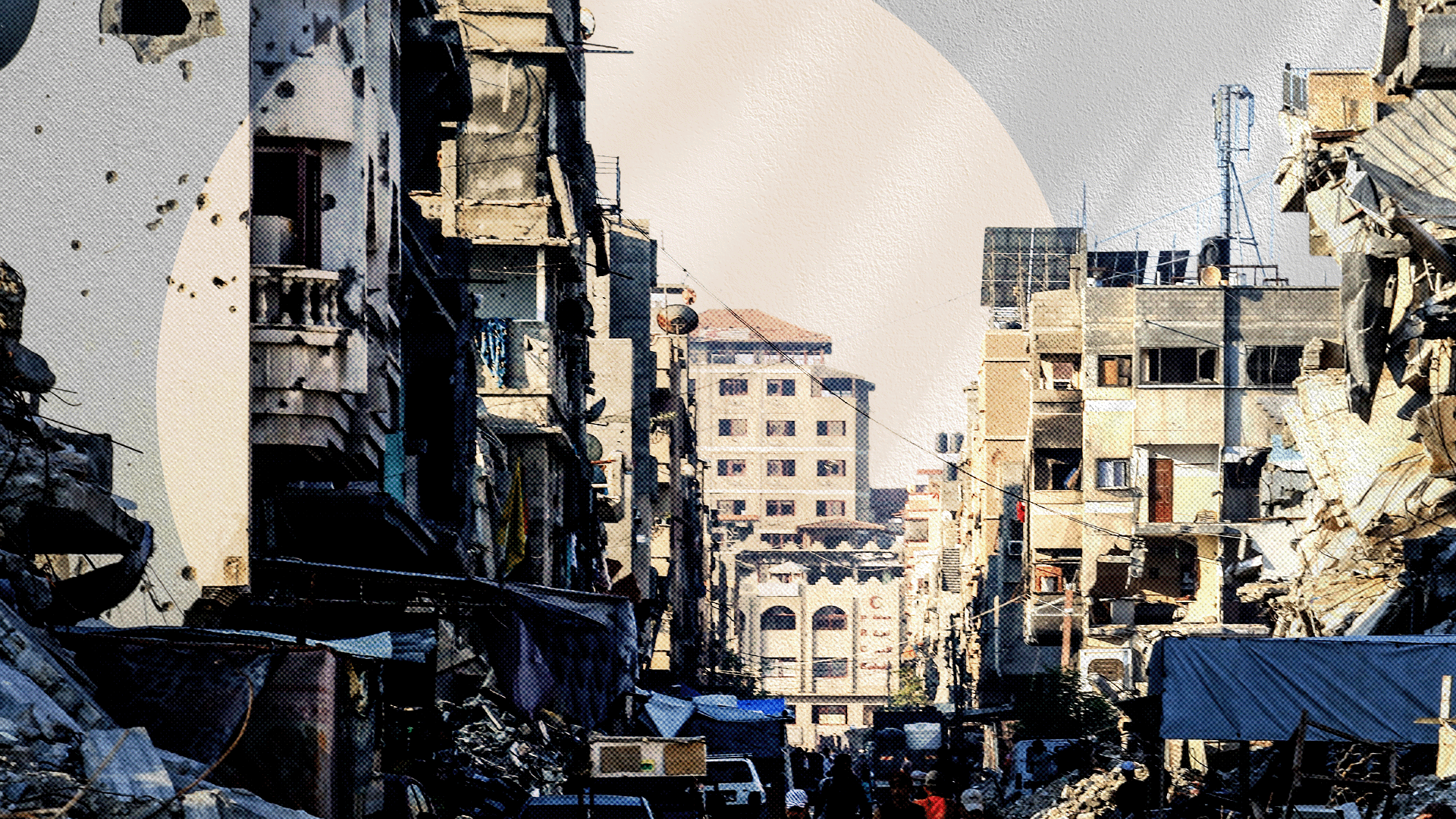Israel-Gaza war: World Food Programme stops deliveries to northern Gaza
- Published
I miss bread, says girl, as Gaza food crisis mounts
The World Food Programme has paused "life-saving" food deliveries to northern Gaza, saying aid convoys had endured "complete chaos and violence due to the collapse of civil order".
The agency says the decision has not been taken lightly and crews had faced crowds, gunfire and looting.
The UN has been warning of looming famine in the north since December.
The WFP says these latest reports are proof of a "precipitous slide into hunger and disease".
The Israeli military ordered 1.1 million Palestinian civilians to evacuate all areas north of Wadi Gaza and seek shelter in the south at the start of its ground offensive in October. The evacuation area included Gaza City - which before the war was the most densely populated area of the territory.
Most residents followed the Israeli order, but several hundred thousand chose to stay or were unable to flee as Israeli troops encircled the region and then largely took control of Hamas strongholds there.
Last month the UN agency for Palestinian refugees, Unrwa, said at least 300,000 people who had remained in northern Gaza depended on its assistance for their survival.
Aid deliveries to the north have been scarce and dependent on security clearances from the Israeli military.
This weekend the WFP had hoped to begin a week-long delivery, sending 10 lorries each day to help "stem the tide of hunger and desperation".
But on Sunday, as a convoy neared the Wadi Gaza checkpoint on its way north, it was "surrounded by crowds of hungry people" with "multiple attempts by people to climb aboard" and then on entering Gaza City faced gunfire, "high tension and explosive anger".
Additionally, several lorries driving between the southern city of Khan Younis and the central town of Deir al-Balah had been looted and a driver beaten.
The WFP said over the past two days its teams had "witnessed unprecedented levels of desperation" in the Gaza Strip.
"Food and safe water have become incredibly scarce and diseases are rife, compromising women and children's nutrition and immunity and resulting in a surge of acute malnutrition," it said.
"People are already dying from hunger-related causes," it added.

Palestinians carry bags of flour they took from an aid convoy
A joint report issued by the WFP and the UN's children's agency UNICEF on Monday found that the the situation was "particularly extreme" in the north of Gaza.
Nutrition screenings conducted at shelters and health centres in the north found that more than 15% of children under two years of age were "acutely malnourished", the WFP said.
The agency said it would seek ways to resume deliveries in a "responsible manner" as soon as possible and urged a major expansion of aid to northern Gaza. It said this would require significantly higher volumes of food entering Gaza from multiple routes and called for crossing points between Israel and northern Gaza to be opened.
It also called for a functioning humanitarian notification system, a stable communication network and security for its staff and partners as well as for Gazans themselves.
"Gaza is hanging by a thread and WFP must be enabled to reverse the path towards famine for thousands of desperately hungry people," it says.
Meanwhile, the UN human rights office said it was "continuing to closely monitor the situation" when asked about a statement from seven independent UN experts expressing concern about reports of violence by Israeli forces against Palestinian women and girls in Gaza and the occupied West Bank.
Reem Alsalem, an expert on violence against women and girls, and Francesca Albanese, an expert on human rights in the Occupied Palestinian Territories, said they were "appalled" by the "credible allegations", including that women and girls had been killed extrajudicially in Gaza while seeking refuge or fleeing, and that others detained in Gaza and the West Bank had been "subjected to multiple forms of sexual assault, such as being stripped naked and searched by male Israeli army officers".
"At least two female Palestinian detainees were reportedly raped while others were reportedly threatened with rape and sexual violence," they added, without providing further details, external.
Israel's mission to the UN in Geneva rejected the "despicable and unfounded claims", external and accused the experts of being "motivated by their hatred for Israel, not by the truth".
In a statement on Tuesday the UN human rights office said: "We reiterate that Israel must comply fully with the provisional measures ordered by the International Court of Justice, and ensure full accountability for the conduct of its military and security forces."
Israel launched its operations in Gaza following an attack by Hamas gunmen on southern Israel on 7 October, during which about 1,200 people were killed and more than 240 others taken hostage.
The Israeli military campaign against Hamas has killed 29,000 people in the Palestinian territory, according to the Hamas-run health ministry there.
Related topics
- Published10 February 2024

- Published22 December 2023

- Published16 January
